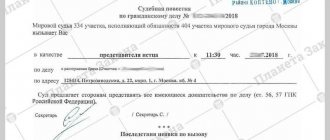Disagreements between an employer and his subordinate are not uncommon and are often resolved peacefully in the course of business. But, if a compromise cannot be reached, both parties can turn to the territorial court to resolve the problem.
Most often, disputes arise on financial grounds: withholding fines, non-payment of wages, sick leave, vacation pay, bonuses. But in many cases, outright violations of contractual relations and illegal dismissal are recorded.
This type of disagreement, where the parties are the employer and the employee, is called an individual labor dispute.
What is a statute of limitations?
From the point of view of civil law, this term defines a certain period during which it is possible to file a claim in court to protect and restore violated rights. In paragraph 1 of Art. 196 of the Civil Code of the Russian Federation, the general limitation period is 3 years from the moment of actual detection of a violation of a citizen’s rights.
Meanwhile, in the Labor Code of the Russian Federation there is no concept of a “limitation period”, but there is a “term for filing a lawsuit”. Both concepts have the same essence, but when it comes to labor relations, it is more correct to talk about the time limit for going to court to resolve an individual labor dispute.
Results
In conclusion, we note:
- a claim can be filed at any time, unless a mandatory pre-trial procedure, including a claim procedure, is established by law;
- The APC provides, as a general rule, a mandatory 30-day period from the date of filing the claim, which must precede the filing of the claim (in relation to business entities);
- after the expiration of the specified period, the demand can be sent at any time, but before the expiration of the general limitation period in relation to a specific category of disputes.
You can find more complete information on the topic in ConsultantPlus. Free trial access to the system for 2 days.
What are the deadlines for applying to a labor court?
According to Art. 391 of the Labor Code of the Russian Federation, claims filed by:
- workers with violated labor rights;
- employees reporting illegal actions of employers;
- employers who suffered damage due to the fault of a subordinate;
- citizens who have received an unlawful refusal to hire;
- citizens working for individuals who are not individual entrepreneurs;
- persons who have been discriminated against.
The statute of limitations for employees is different from the statute of limitations for employers. All of them are spelled out in Art. 392 of the Labor Code of the Russian Federation, which establishes the right to go to court for both parties, as well as the grounds for appeal.
IMPORTANT! In relation to individual labor disputes, the general provisions of civil law do not apply. In this matter, you need to be guided exclusively by the Labor Code of the Russian Federation.
Time limits for filing a lawsuit for an employee
Under Part 1 of Article 92 of the Labor Code of the Russian Federation, employees are provided with the following deadlines and grounds for going to court:
- 3 months from the date of establishment of the fact of violation of the employee’s rights or from the day when the employee should have learned about this violation;
- 1 month from the date of receipt of the work record book or dismissal order for cases of disputes regarding dismissal;
- 1 year from the date on which full cash payment is due for disputes based on non-payment or incomplete payment of wages.
Due to such short deadlines (except for the third point), as well as legal illiteracy, most workers who have labor disputes go to court late. The court is obliged to accept the statement of claim and begin proceedings in the case even after the deadline has expired. But, if on this occasion the responding party petitions for dismissal of the claim, then, unless the plaintiff has a valid reason for missing the deadline for filing the claim, the court will refuse to consider the case.
Time limits for going to court for an employer
Employers, in turn, have a longer period of time to go to court. In Part 2 of Art. 392 of the Labor Code of the Russian Federation, this period is stated as 1 year, during which the recovery of damage caused by the employee can be demanded in court. The countdown begins from the moment the damage is discovered. The application can be submitted both for employees currently on staff and for those already dismissed. In case of missing the agreed deadlines for going to court, employers must also provide a valid reason.
Article 154 of the Code of Civil Procedure of the Russian Federation. Time limits for consideration and resolution of civil cases (current version)
The European Court concluded that the proceedings began on 3 October 1997 and ended on 13 September 2007. At the same time, the period taken into account by the Court begins on 5 May 1998, when the Convention for the Protection of Human Rights and fundamental freedoms came into force in relation to the Russian Federation. Thus, the total duration of the proceedings within the competence of the European Court was 9 years and 4 months, during which the applicant’s case was considered in two instances. This length of time cannot be explained by the complexity of the case or the nature of the applicant's behavior during the proceedings. A characteristic flaw in the trial in this case was the inexplicable delays in conducting examinations, which caused the suspension of proceedings in the case for almost two years. The courts did not use the tools of control over judicial proceedings to the necessary extent, including during the period of suspension of proceedings in the case and the conduct of the examination.
The European Court found a violation of the requirements of paragraph 1 of Art. 6 of the Convention regarding the excessive length of the proceedings and violation of a reasonable time limit (see the ECHR Judgment of April 11, 2013 in the case “Aborina v. Russian Federation”).
At the same time, when considering another case with a significant duration of the trial, the European Court of Human Rights did not find the requirement for a reasonable period of trial to be violated, taking into account the behavior of the plaintiff in the case.
Example: On October 21, 2001, the applicant filed a claim against Yu. in the Petrogradsky District Court of St. Petersburg to establish paternity and collect alimony. The first court hearing in the case took place on April 22, 2002, the court granted the defendant’s request to transfer the case to the Nevsky District Court of St. Petersburg. The first hearing in this court was scheduled for November 6, 2002. The hearing of the case was postponed due to the applicant being given time to collect additional evidence until February 4, 2003. Subsequently, the hearing of the case was repeatedly postponed due to the failure of the parties to appear. One court hearing was postponed due to the applicant's inappropriate behavior in the courtroom. Another meeting did not take place due to the judge’s illness. Repeatedly, the court issued rulings to conduct a genetic examination; a writ was sent to the court at the place of residence of the applicant and her child, as well as the defendant, to collect blood samples and submit them to the genetic examination center. However, the parties did not appear at the genetic testing centers. On July 10, 2008, the court made a decision to dismiss the claim, which was overturned on November 13, 2008 by the St. Petersburg City Court due to improper notification of the plaintiff about the examination. On December 1, 2008, the district court sent the necessary materials for DNA testing and notified the parties of the date and place of the examination. However, on January 12 and February 17, 2009, only the defendant appeared at the genetic testing center. On February 18, 2009, the claim was again dismissed; the plaintiff’s appeal on April 21, 2009 was left unsatisfied by the St. Petersburg City Court. Thus, the trial began on October 24, 2001 and ended on April 21, 2009. It lasted approximately 7 years and 6 months.
When assessing the reasonableness of the trial period, the European Court took into account the applicant’s behavior, taking into account the fact that several times the trial was postponed to another date due to her failure to appear, illness, or violation of discipline during the trial. The European Court particularly noted the fact that the applicant never appeared for DNA testing, including in the city of her residence. The European Court also noted that there were delays in the consideration of the case due to the fault of the court, in particular related to the illness of the judge and his participation in various proceedings, but this delay amounted to approximately 6 months. Taking this into account, the European Court recognized that both the judicial authorities and the genetic examination centers complied with the necessary deadlines in the applicant’s case, avoiding delays for a long period of time, and did not violate paragraph 1 of Art. 6 of the Convention on a reasonable time for trial (ECtHR Judgment of January 13, 2011 in the case “Kolkova v. Russian Federation”).
4. Optimization of judicial activity during judicial reform, numerous case law of the European Court of Human Rights in cases involving the Russian Federation have intensified the search for the necessary balance between the duration of the trial and the correctness of the resolution of the case.
Until 2010, the European Court of Human Rights had repeatedly noted the lack of effective legal remedies in the Russian Federation in relation to the excessive length of judicial procedures of a preventive and compensatory nature, allowing participants in the process to influence the duration of the trial.
A set of measures to fill this gap was adopted in 2010 by Federal Laws of April 30, 2010 N 68-FZ “On compensation for violation of the right to legal proceedings within a reasonable time and the right to execution of a judicial act within a reasonable time” and N 69-FZ “ On amendments to certain legislative acts of the Russian Federation in connection with the adoption of the Federal Law “On compensation for violation of the right to legal proceedings within a reasonable time and the right to execution of a judicial act within a reasonable time.”
In particular, the very concept of “a reasonable period of trial” was introduced into the legislation, including the Code of Civil Procedure of the Russian Federation, the possibility of filing an application to expedite the consideration of the case and its resolution by the chairman of the court was introduced (Part 7 of Article 6.1 of the Code of Civil Procedure of the Russian Federation), and special compensation was established for the defense the right to legal proceedings within a reasonable time and the procedural mechanism for its collection, regulated in civil proceedings by Chapter 22.1 of the Code of Civil Procedure of the Russian Federation (lost in force on September 15, 2015 due to the entry into force of the CAS RF; currently the corresponding chapter is provided for by this Code).
5. The period for consideration and resolution of a civil case is one of the procedural deadlines.
Procedural deadlines mean a period established by law or appointed by the court during which certain procedural actions can or must be performed.
Unlike most deadlines that establish time intervals for the performance of procedural actions by persons participating in the case, the rules on the timing of consideration and resolution of a civil case outline the period of trial for the court. It is on the court organizing and directing the consideration of the civil case that, first of all, compliance with these deadlines depends.
Since these deadlines regulate the activities of the court, they have significant specificity compared to other procedural deadlines.
Another famous Russian lawyer E.V. Vaskovsky wrote that in relation to the court, deadlines have purely instructional significance; failure to comply with them by the court does not deprive him of the right to perform overdue procedural actions.
———————————
See: Vaskovsky E.V. Textbook of civil procedure. M., 2003.
Procedural deadlines addressed to the court, including the deadline for consideration and resolution of a civil case, are not subject to the general rules for restoring missed deadlines (Article 112 of the Code of Civil Procedure of the Russian Federation), as well as the legal consequences of missing procedural deadlines - extinguishment of the right to perform an overdue procedural action (Article 109 of the Code of Civil Procedure of the Russian Federation ).
6. Part 1 of the commented article establishes the general period for consideration and resolution of civil cases for federal courts and magistrates.
In contrast to the previously existing Civil Procedure Code of the RSFSR of 1964, the legislator in the commented article refused to regulate the timing of individual stages of the process, establishing a general period for consideration and resolution of the case. Yes, Art. 99 of the Code of Civil Procedure of the RSFSR provided for a seven-day period for preparing a case for trial, which in exceptional cases in cases of particular complexity could be extended to 20 days, and a month for consideration of the case, calculated from the moment the case was prepared for trial. Shortened deadlines for consideration were established for certain categories of cases.
Thus, the court now determines the duration of each stage of the process depending on the preparedness of the case for the further stage of consideration.
Differences in the time periods for consideration of cases by federal courts and magistrate judges are explained by the peculiarities of the competence of magistrate judges; Justices of the Peace typically hear civil cases with a low cost of action that do not require extensive preparation or lengthy trial proceedings.
7. The calculation of the period for consideration and resolution of the case is subject to the general rules for determining procedural deadlines.
As established in Part 3 of Art. 107 of the Code of Civil Procedure of the Russian Federation, the course of the procedural period, calculated in years, months or days, begins the next day after the date or occurrence of the event that determines its beginning.
Part 1 art. 154 of the Code of Civil Procedure of the Russian Federation will determine different points at which the period for consideration of the case begins for federal courts and magistrates. For federal courts, the calculation of the period begins from the moment the application is received by the court, for justices of the peace - from the moment the application is accepted. Thus, in the proceedings of federal courts, established by Part 1 of Art. 154 of the Code of Civil Procedure of the Russian Federation, the term determines the time period for passing through three stages of the process (acceptance of an application, preparing the case for trial, trial), and for magistrates - only two stages (preparing the case for trial and trial). Such a distinction can hardly be considered successful, since the procedural activities of federal courts and magistrates at the first two stages of the civil process do not have significant differences. This difference can only be explained by the short period of consideration of the case established for magistrates. The legislator, having provided for a short period for consideration of a case for magistrates, taking into account the fact that the jurisdiction of magistrates includes cases that are not of great complexity with a small cost of the claim, at the same time introduced a more preferential procedure for calculating this period for magistrates.
The period for consideration of the separated claim (requirements) should be calculated from the date of the start of the period for the originally stated demand, and when merging cases into one proceeding, the period for consideration of such a case is calculated from the date of the earliest start of the period for one of the combined cases (clause 8 of the Resolution of the Plenum of the Supreme Court of the Russian Federation dated December 27, 2007 N 52 “On the time limits for consideration by the courts of the Russian Federation of criminal, civil cases and cases of administrative offenses”).
8. The end of the period for consideration and resolution of a case established by the commented article is associated with the issuance by the court of first instance of a judicial act in the case resolving the case on the merits (decision), or an act ending the consideration of the case without resolving the case on the merits (ruling on the termination of proceedings in the case or leaving the application without consideration). Subsequent stages of civil proceedings have their own procedural deadlines for consideration.
The end of the period for consideration and resolution of the case is determined according to the rules of Art. 108 of the Code of Civil Procedure of the Russian Federation: a period calculated in months expires on the corresponding date of the last month of the term; If the end of a period calculated in months falls on a month that does not have a corresponding date, the period expires on the last day of this period.
Non-working days and holidays do not affect the calculation of the period and are included in it, with the exception of the case when the last day of the procedural period falls on a non-working day, in which case the end of the period is considered the next working day.
Example: if the statement of claim was received by the court on January 15, the period for consideration of the case begins on January 16 and ends on March 15. If the statement of claim was received by the court on December 23, the period for consideration of the case begins on December 24, ends on the holiday of February 23 and is extended until the first working day after it.
9. Just like other procedural deadlines, the period for consideration of the case is suspended simultaneously with the suspension of the proceedings (Article 110 of the Code of Civil Procedure of the Russian Federation).
The grounds for suspending the proceedings are established by Art. 215, 216 Code of Civil Procedure of the Russian Federation. During the period of suspension of proceedings in the case, no procedural actions are carried out.
The Plenum of the Supreme Court of the Russian Federation requires judges to monitor the termination of the circumstances that served as the basis for the suspension of proceedings in the case, in order to exclude facts of an unjustified increase in the time the case is in court proceedings (clause 9 of the Resolution of December 27, 2007 No. 52 “On the timing of consideration by the courts Russian Federation of criminal, civil cases and cases of administrative offenses"). Simultaneously with the resumption of proceedings in the case, the period for consideration of the case continues.
10. The Code of Civil Procedure of the Russian Federation, unlike the Arbitration Procedure Code of the Russian Federation, does not provide in the commented article for an extension of the period for consideration of a case at the initiative of the court. So, in accordance with Part 2 of Art. 152 of the Arbitration Procedure Code of the Russian Federation, the period established for consideration of the case (in the arbitration process, this period is no more than 3 months from the date of receipt of the application to the court), can be extended on the basis of a reasoned determination of the judge considering the case, by the chairman of the arbitration court, up to 6 months in connection with a special the complexity of the case, with a significant number of participants in the arbitration process.
The Code of Civil Procedure of the Russian Federation mentions the possibility of extending the period for consideration of the case in Part 2 of Art. 6.1, containing a reference norm to other articles of the Code.
At present, an actual extension of the time limit for consideration of a case in civil proceedings is possible in the presence of certain circumstances with which the law connects a new calculation of the period established by law for consideration and resolution of the case.
For example, part 3 of Art. 152 of the Code of Civil Procedure of the Russian Federation establishes that in complex cases, taking into account the opinions of the parties, the judge may set a time limit for a preliminary court hearing that goes beyond the time limits established by this Code for the consideration and resolution of cases. Appointment of a preliminary court hearing outside the limits established by Part 1 of Art. 154 of the Code of Civil Procedure of the Russian Federation, the period for consideration and resolution of a case leads to a change in the procedure for calculating such a period in a specific case.
As the Plenum of the Supreme Court of the Russian Federation explained in Resolution No. 11 of June 24, 2008 “On the preparation of civil cases for trial,” when calculating the period for consideration of the case, the period specified in the definition is added to the period provided for by the Code of Civil Procedure of the Russian Federation. Thus, a case is considered to be considered on time if the duration of its consideration does not exceed the total consideration period provided for by the Code of Civil Procedure of the Russian Federation for this category of cases and the period specified in the reasoned ruling on holding a preliminary court hearing (clause 35).
Example: a statement of claim was received by the court on May 15, preparations were made for it (the parties were summoned to court for questioning, presented evidence to the court, the court sent requests for evidence, etc.); On July 10, the judge ruled to hold a preliminary court hearing outside the period for consideration and resolution of the case, scheduling a preliminary court hearing for July 22. Thus, to the two-month period established by law, a period of 12 days is added (the time from the moment the ruling is made to the date of the appointment of the preliminary court hearing outside the period established by law for consideration and resolution of the case), the period for consideration of the case will be 2 months 12 days.
Other grounds for shifting the beginning of the calculation of the period for consideration and resolution of a case include a change in the basis or subject of the claim, an increase in the size of the claim (Part 3 of Article 39 of the Code of Civil Procedure of the Russian Federation), involvement of procedural accomplices in the case (Paragraph 2 of Part 3 of Article 40 of the Code of Civil Procedure of the Russian Federation) , replacement of an improper defendant (part 2 of article 41 of the Code of Civil Procedure of the Russian Federation), entry of third parties into the process (part 2 of article 42 of the Code of Civil Procedure of the Russian Federation).
In accordance with the explanations of the Plenum of the Supreme Court of the Russian Federation, set out in paragraph 7 of Resolution No. 52 of December 27, 2007 “On the time limits for consideration by the courts of the Russian Federation of criminal, civil cases and cases of administrative offenses,” since in the case of involving a co-defendant or co-defendants to participate in the case (Part 3 of Article 40 of the Code of Civil Procedure of the Russian Federation), replacing an improper defendant with a proper one (Part 1 of Article 41 of the Code of Civil Procedure of the Russian Federation), preparation and consideration of the case in court are carried out from the very beginning, the course of the period for consideration of the case provided for by the Code of Civil Procedure of the Russian Federation, by analogy with the provisions of Part 3 of Art. 39 of the Code of Civil Procedure of the Russian Federation must begin from the day the corresponding procedural action was performed. The period for consideration of the case should be calculated in a similar way when a third party enters into the case, making independent claims regarding the subject of the dispute, since by virtue of Part 1 of Art. 42 of the Code of Civil Procedure of the Russian Federation, this participant in the legal relationship enjoys all the rights and obligations of the plaintiff, including the right to change the basis of the claim and increase the amount of the claim.
The law does not stipulate the rules for calculating the period for consideration of a case when the court accepts a counterclaim.
In accordance with the explanations of the Plenum of the Supreme Court of the Russian Federation, in this case the analogy of the law should be applied and on the basis of Part 4 of Art. 1 and part 3 of Art. 39 of the Code of Civil Procedure of the Russian Federation, the period for consideration and resolution of a civil case is calculated from the date the court accepted the counterclaim (clause 10 of the Resolution of the Plenum of the Supreme Court of the Russian Federation dated June 26, 2008 No. 13 “On the application of the norms of the Civil Procedure Code of the Russian Federation when considering and resolving cases in the court of first authority").
11. In addition to the general deadlines for consideration of a case, the law establishes shortened deadlines for certain categories of cases.
First of all, Part 2 of the commented article names two categories for which the period for consideration and resolution of the case is reduced by half: cases of reinstatement at work and collection of alimony. The accelerated resolution of such claims is explained by the need for prompt restoration of the violated right and the significance of the subject of the dispute for the plaintiff.
All rules for the beginning and end of the period, suspension of the period, described in the commentary to Part 1 of Art. 154 of the Code of Civil Procedure of the Russian Federation, fully apply to shortened terms.
The Code of Civil Procedure of the Russian Federation also contains other categories of cases for which shortened deadlines for consideration and resolution are established. Until September 15, 2015, there were quite a lot of such categories of cases in the Code of Civil Procedure of the Russian Federation (on challenging the actions and decisions of state bodies and officials, on challenging regulatory legal acts, on the protection of voting rights and the right to participate in a referendum, on forced hospitalization in a psychiatric hospital , on compulsory psychiatric examination). However, since September 15, 2015, all of the listed categories of cases are included in the CAS of the Russian Federation.
At the same time, for certain cases, accelerated deadlines for consideration remained in civil proceedings. So, part 1 of Art. 420 of the Code of Civil Procedure of the Russian Federation establishes a one-month period for consideration of an application to cancel the decision of the arbitration court, part 1 of Art. 425 of the Code of Civil Procedure of the Russian Federation - the same period for considering applications for the issuance of a writ of execution for the forced execution of an arbitration court decision, part 1 of Art. 427.3 of the Code of Civil Procedure of the Russian Federation - a similar period for consideration of applications in cases related to the performance by courts of assistance functions in relation to arbitration courts.
Cases of writ proceedings (Chapter 11 of the Code of Civil Procedure of the Russian Federation) and simplified proceedings (Chapter 21.1 of the Code of Civil Procedure of the Russian Federation) are expedited.
In cases where claims are combined in one proceeding, for some of which the law has established a shortened period for consideration, and for others - a general one (for example, to establish paternity and collect alimony), the case is subject to consideration and resolution before the expiration of two months from the date of receipt of the application to the court, regardless of the fact that a shortened period has been established for one of the requirements (clause 1 of the Resolution of the Plenum of the Supreme Court of the Russian Federation of June 26, 2008 No. 13 “On the application of the norms of the Civil Procedure Code of the Russian Federation when considering and resolving cases in the court of first instance” ).
The procedure for filing a claim in court to resolve a labor dispute
First of all, the applicant needs to decide what he expects as a result of the trial and whether he will be able to restore his previous employment relationship in the future. His main task at the moment is to clearly define the requirements that will form the basis of the statement of claim.
Going to court involves collecting the necessary package of documents related to labor relations. It is advisable to have such a package from the moment of official hiring. But if necessary, the organization is obliged to provide all the required documents and their copies within three days from the date of the request (Article 62 of the Labor Code of the Russian Federation).
In addition, it is necessary to determine in which court the case should be heard.
The law establishes that the statement of claim must be filed with the district court at the location of the defendant. In some cases, you can contact the location of the defendant’s branch.
Details of the defendant's stay can be found in the employment agreement or contract.
If the main demand of the plaintiff is the recovery of wages in the amount of up to 50,000 rubles, the case will be considered in the magistrate's court. In other cases, the appeal must be made to the territorial court. A statement of claim to the court to resolve labor disputes must be drawn up in the form specified by law. This is an independent document, which, if drafted incorrectly, will not be considered.
When filling out an application, information about the plaintiff and defendant must be written down in full, without abbreviations. The text of the application must describe the problem in detail, preferably with references to the norms of the Labor Code that the defendant violated. Next, the plaintiff clearly lists his main demands. The application must be accompanied by copies of the work record book, employment contract and all documents confirming violations of the applicant’s rights.
From judicial practice
Unscrupulous employers, unwilling to provide payments and benefits, may infringe on the rights of pregnant women. One of them filed a claim in court demanding reinstatement to her previous position, recovery of average earnings for the period of forced absence for health reasons, as well as compensation for moral damage.
The reason for going to court was the termination of the employment contract, while the employer was informed about the employee’s situation.
After the dismissal, the plaintiff submitted an application to the employer for reinstatement at work, attaching a certificate of pregnancy, but, nevertheless, received a refusal to cancel the dismissal order. The reason for the refusal was the employer's doubt about the authenticity of the medical certificate.
The court of first instance refused to satisfy the woman's claims, based on the fact that the established Art. 392 of the Labor Code of the Russian Federation, the deadline for filing a claim in court for reinstatement at work. But the woman challenged the decision of the trial court on appeal. In a higher court, she pointed out that termination of an employment contract at the initiative of an employer with a pregnant woman is not allowed, except in cases of liquidation of the organization or termination of activities by an individual entrepreneur. At the same time, the employer’s lack of information about her pregnancy is not a basis for refusing the claim.
The deadline for filing a claim in court was missed for a good reason, since while she was expecting a child, she was observed in a medical organization at her place of residence in another region. In this regard, the dismissal cannot be considered legal and justified. The higher court found her arguments justified and overturned the decision of the first instance. In favor of the plaintiff, wages for the period of forced absence were recovered, as well as moral damages totaling more than 860 thousand rubles.
Drawing up statements of claim by a lawyer
We at the Legal Guarantee Law Office have drawn up more than 10,000 statements of claim in court, and therefore we know: a well-drafted statement of claim is 70% of your success. And, sometimes, even 90%.
The statement of claim is the court's first acquaintance with your case. Just as people meet by their clothes, so the court meets by the statement of claim.
There are many nuances of legal disputes that are known only to lawyers who are “in the business”: constantly working on the issues of their clients in this direction. Therefore, we are convinced of “Legal Guarantee”: in complex legal disputes, it is better to immediately order a statement of claim from a lawyer.
The deadline for filing a statement of claim in court is 3 days. This is an average period; of course, in each specific case, the preparation time depends on the circumstances of the legal dispute.
We will draw up a competent claim in court
An experienced lawyer will file a claim in court within 3 days.
Free assessment of the prospects for a legal dispute. Try it
All lawyers of our Bureau have higher legal education. 90% of employees are engaged not only in consultations and documents, but also actively represent the interests of legal entities and individuals in courts. The experience we can offer to solve your problem is extensive.
Baldin Dmitry Aleksandrovich, director of the Law Firm "Legal Guarantee"
Reimbursement
We include the cost of our services for drawing up a statement of claim in the price of the claim. This amount is recovered from the losing party. That is, if you win, our services are practically free for you.
We multiply the winnings from the claim
In our work we use an integrated approach and want our client to get more. We carefully study the situation, looking for ways to collect additional penalties, penalties, and fines in your favor.
You receive not only a well-written document.
Our lawyers provide legal advice: we explain to you every letter of the document drawn up and what is behind it.
We determine the jurisdiction of the dispute, we tell you where and how to file a statement of claim or claim (in the case of a claim procedure);
We collect evidence for the client - where required;
Together with you, we will draw up a strategy and tactics for behavior in court - in the event that you represent your interests in court independently.
We offer the services of a lawyer to the arbitration court (in arbitration courts, a representative with a higher legal education is required) or to a court of general jurisdiction (in the case of a criminal case, a criminal defense lawyer is required).
85% of our clients return to us when other problems arise in the legal field. This is an honest indicator of our work for you.
About our Bureau / Our magazine
We will draw up an individual claim for you
I need a statement of claim
We will draw up a statement of claim to the court in Moscow
You will receive assistance from a lawyer in our Law Office in Moscow at:
Moscow, Avtozavodskaya 23A, building 2, office 320.
Sign up for a consultation : +7
Registration online
Assistance in drawing up statements of claim in Omsk
Office of the Law Firm "Legal Guaranty" in Omsk
Omsk, st. Maslennikova, 72, 2G
Sign up for a consultation in Omsk: +7 (3812) 388-355
Registration online







